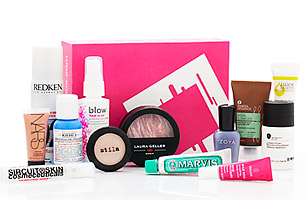
This past spring, Markus Rauschnabel began to notice that his Westchester neighbor, a new mom, was receiving tons of Amazon packages in the mail. It reminded Rauschnabel, a father of three, what his own wife went through when she had a newborn: long days trapped at home without even a minute to run to the store. "I had an epiphany that maybe we can help moms at home so they can discover products before they have to buy them," says Rauschnabel. "Half of what my neighbor orders goes back unless it's diapers."
The furniture design company that Rauschnabel was running with partner Sebastian Reichelt had been stalling — in part because of the huge expense of shipping large items. So the two German entrepreneurs decided to wind it down and follow Rauschnabel's hunch. The result was Bluum — a play on the German word "Blume," for flower — which sends four to five deluxe product samples like baby wipes, stretch-mark cream and baby shampoo to customers' doorsteps for $12 a month (or $11 for three months; including shipping.)
With a team already in place from their previous business, Rauschnabel and Reichelt were able to get things moving fast, creating a website in four weeks and making its first deliveries three weeks later. Bluum hired two mom experts to test and sort through baby and beauty products so that the only best samples make it to customers.
They seem to be choosing well. Since September, when its first boxes shipped, Bluum has doubled the number of customers each month, largely thanks to word of mouth, social media and mommy blogs promoting the service. In January, Bluum sent out 5,000 boxes. "There are a lot of products that you discover that you wouldn't have known about otherwise," says Erica Borunda, a 29-year-old new mom from Phoenix who found out about Bluum through a blog. "That's what I like about it most."
Indeed, subscription-based startups are one of the hottest new trends in e-commerce these days with investors lining up to fund everything from beauty products (Birchbox) to premium coffee samples (Craft Coffee) to toiletries and other household staples (Guyhaus, Hoseanna) to undershirts (Manpacks) to PMS-easing products (yes, you read that right; it's called Good and Lovely) and even gifts for your dog (BarkBox), to name but a few.
Sure, the business model is just an updated version of your grandmother's Fruit of the Month Club, but there's a twist. Today's subscription sites focus on building online communities and relationships with customers, offering advice on how to use the products and creating stories around the brands so customers feel connected to the site and to one another. "Subscription startups have gotten really hot in the last two or three years as people will pay for convenience," says Nick Seguin, manager of entrepreneurship at the Kansas City, Missouri-based Kauffman Foundation. "It all comes back to better and cheaper logistics and leveraging excess stock or inventory."
Birchbox, which delivers deluxe beauty samples to your doorstep for $10 a month, was the first of these modern subscription businesses to really take off. Katia Beauchamp and Hayley Barna were section-mates at Harvard Business School and Beauchamp remarked that Barna always had tons of cool cosmetics. It turned out that Barna's best friend, Mollie Chen (now Birchbox's editorial director), was a beauty editor at Conde Nast and gave her lots of free products. That spawned the idea of Birchbox, which they launched in September 2010 from their campus apartments. "We wanted to give everyone a best friend beauty editor," says Beauchamp. The biggest hurdle: getting people to think about samples differently. "Starting was intimidating because we were asking both sides, consumers and beauty brands, to change their behavior," wrote Beauchamp in an email. "We wanted to change the value of a sample." Sites like Birchbox and Bluum pitch themselves as vehicles for customers to discover and test the best products out there.
The business model is a lucrative proposition for both Birchbox and the 150 company partners like Kiehl's, NARS, Stila, Benefit and Laura Mercier whose products are being pitched. Birchbox gets beauty samples for free and the featured brands get their products in front of interested buyers, who can easily purchase full-size versions on Birchbox's online shop. Brands can get coveted customer data like purchasing behavior and demographics. And for customers Birchbox offers original editorial content with beauty advice — think popular hair-style videos — that keeps them coming back and interacting.